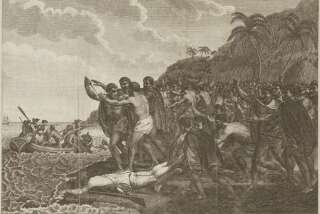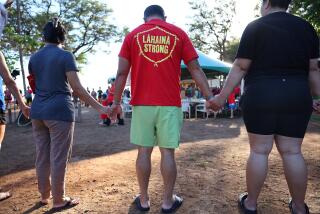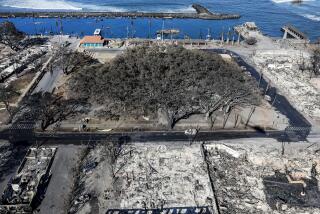Capt. Cook’s Legacy to the Modern World : Hawaii: His discovery linked the inhabited world but also opened the door to worldwide siege of native peoples.
- Share via
On this day, Jan. 18, in 1778, Capt. James Cook sailed into the Hawaiian Islands, establishing permanent contact between the Hawaiians and the outside world. In this, his final voyage of exploration across the Pacific for the British navy, Cook contacted the last great nation not yet known to the outside world.
Cook named the islands the Sandwich Islands after the Earl of Sandwich, a corrupt Lord of the Admiralty who is better known to us as the inventor of the sandwich, which he could eat with one hand while still gambling with the other hand. Even though the food still bears his name, the natives of the islands refused to give up their ancient and sacred name of Hawai’i. If the modern world has a birthday, it should be this day. With the inclusion of Hawaii into the world system, virtually all parts of the inhabited world had been united into a single system of transportation, communication and trade. That system stretched across every ocean, uniting every continent and island chain from the Arctic to Antarctica.
These contacts did not always prove beneficial to the people who made them or those upon whom they were thrust. Cook was more of an explorer than a conqueror, but he had little sense of the rights of people who were not British. On Valentine’s Day, 1779, Cook created a skirmish with the Hawaiians that resulted in their clubbing him to death on the beach where he had been so warmly welcomed a year earlier.
The real victims of the era, however, turned out to be the Hawaiian people themselves. In 1893, a little more than a century after Cook’s death, the Hawaiian monarchy was overthrown and native Hawaiians became a disenfranchised and impoverished minority in their own land, a situation from which they have not yet recovered. The population of several hundred thousand at the time of Cook’s arrival had declined to only 60,000 by 1900.
Over the past two centuries from the time of Capt. Cook, the thin lines of international trade grew steadily stronger connecting Europe, America, the Pacific, Asia and Africa into a single world system. From a spider web of tentative contacts across the seas, the ties became strong ropes that tightly bound more and more native people under the yoke of colonialism.
The natives of the South Pacific from Hawaii to Australia suffered much the same fate as the natives of the Americas. In most of these areas the population declined by 90% in the first century of contact. They died from new diseases and plagues, and they died in conquest. They steadily lost control of their land and their resources. The new colonial governments pushed the native people deeper into poverty and into the most inaccessible and inhospitable reaches of their homelands. Unable to cope with the disease and destruction around them, many tribal peoples disappeared from history.
Even though it has been more than 200 years since Cook’s arrival in Hawaii, the siege of native people has not yet ended. The Hawaiians still struggle for legal recognition of their basic cultural rights. In the South Pacific, the Maoris struggle for their treaty rights within New Zealand Society. The Tahitians struggle against French use of nearby islands as nuclear testing zones, while the Kanaks of New Caledonia struggle for complete independence from the particularly ethnocentric rule of the French government.
In the Americas the struggle for cultural dignity and survival continues on a continental scale from Tierra del Fuego to the Yukon. In Canada and the United States, native people struggle to protect their treaty rights, while in many parts of Latin America, they struggle for mere survival. Over the last generation, about 100,000 Mayans have been slaughtered by a series of repressive dictators in the mountains in Guatemala. The campaign against the indigenous people still continues.
It is already too late to save the Caribs and Arawaks of the Caribbean or to save the aborigines of Tasmania, but we can save those cultures that are still here and are now endangered.
We may be the last generation in the history of the world to have an influence over the fate of some of these people. If we do not act to ensure their rights to live in their homeland and have a livelihood, some of them such as the Penan of Borneo or the Yanomamo of Brazil may disappear forever.
Even though we cannot undo past injustices, we can be the ones who stop them and thereby prevent future ones. The choice belongs to us, and the ramifications of that choice will echo forever through the future.
More to Read
Sign up for Essential California
The most important California stories and recommendations in your inbox every morning.
You may occasionally receive promotional content from the Los Angeles Times.












